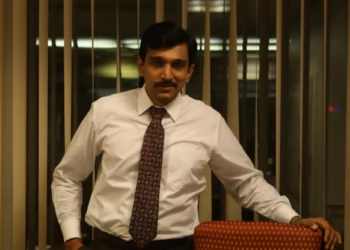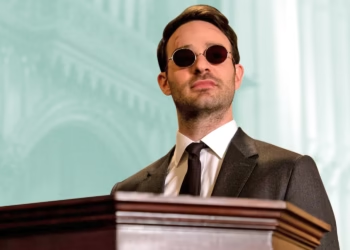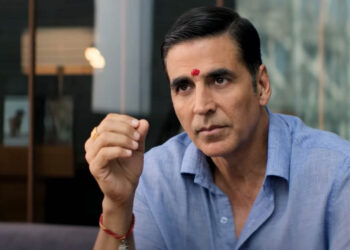A plot twist isn’t as straightforward as it appears. The “surprise ending” can’t be a haphazard leap of faith. It must be a resolution, an earned moment, rather than something created solely to deceive the spectator.
Its best buddy is hindsight. It must alter our interpretation of the picture, not the plot. It should provide background information about the characters’ lives before moving on to the plot of their lives.
Psycho, The Shawshank Redemption, Saw, The Sixth Sense, Seven, Unbreakable, Memento, The Usual Suspects, The Prestige, Shutter Island, Fight Club, and Arrival are just a few of the best Hollywood films that have ended with sleight-of-hand. The best of them deceived us in broad daylight, providing not just a sense of shock but also closure.

The twist, though, isn’t restricted to suspense thrillers. Gulabo Sitabo was a recent example that completely changed our perspective of a “comedy.” (Spoiler alert: if you haven’t seen Gulabo Sitabo or any of the other older films listed here, you should stop reading right now.)
Gulabo Sitabo, directed by Shoojit Sircar and written by Juhi Chaturvedi, is a slice-of-life story about a grumpy landlord and his younger renter. However, the film’s conclusion — in which the landlord’s 95-year-old wife, Begum, elopes, leaving the fighting men with nothing but karma – demonstrates that the film was a cover-up.
The Begum was busy planning other preparations while we were enjoying the small quarrels between two famous faces. It’s not just a trick of the eye: it’s a message about lost love and the fetishization of tradition and age.
It fits pretty perfectly with the setting (Lucknow) and topic and instantly elevates the entire film, which had been little more than a series of Tom-and-Jerry feuds.
Although Hindi movie isn’t recognized for well-crafted story twists, there have been a few remarkable examples. Some are even amusing, yet they contribute to the films’ personalities.
And I’m not talking about the Abbas-Mustan variety, where the entire movie is a plot twist with a tiny bit of story thrown in for good measure.
Here are a few of our personal favorites:
1. Kaun? (1999)
The woman deceives two feuding men and an intrinsically hero-obsessed public once more. However, Ram Gopal Varma’s Kaun? remains one of Hindi cinema’s most innovative psychological thrillers.
A serial killer is on the run, it’s raining outside, and Urmila Matondkar plays a nervous girl who is suspicious of the two shady male strangers she’s allowed into her home.
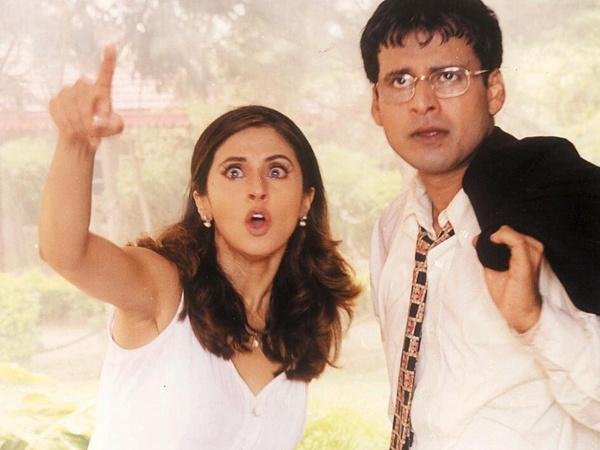
As her suspicions waver between the unpleasant businessman (Manoj Bajpayee in his breakout year) and the sleazy burglar, the film puts us in her uneasy position (Sushant Singh).
The final twist shows the body of the original house owner, proving that the girl had been the serial killer all along.
In Kaun?, a groundbreaking film at a time when a songless Indian chamber thriller was nearly unheard of, the use of rain, sound, atmosphere, language, space, and gender conditioning is second to none.
Our “Bollywood” psyche was irreversibly damaged when we first saw it when we were barely in our teens. Kaun had taught me to read the signs of the twist in The Sixth Sense, which came out later that year.
2. Gupt (1997)
Many moviegoing lives were devastated by four words that became a national hymn for a nosy, gossip-starved Stardust generation: Kajol is the killer, back when texting hadn’t yet made the world a lonely place.

For many ‘90s kids, Rajiv Rai’s Gupt: The Hidden Truth was their first taste of a desi story twist. And, regardless of how hammy and sloppy the movie was, the twist was bold. What’s more, it’s rational.
What’s more, it’s rational. A modest female character played by the queen of romantic Hindi cinema is naturally the last suspect in a crime thriller about a long-haired hero framed for the murder of his stepfather for an audience inexperienced with the dramatic potential of a love triangle.
The deafening symphony of minds being blown across Indian cinema halls in 1997 may be a cult-level joke today, but I can tell you that it was never heard again.
3. Khakee (2004)
A woman attempting to pull the wool over the eyes of a masculine system appears to be a repeating theme in this list. As I previously stated, perhaps the surprise stems from the fact that we don’t anticipate the “heroine” to be anything more than the apple of our heroes’ eyes.
When they retaliate and demonstrate ominous agency, most male filmmakers milk the moment. In Raj Kumar Santoshi’s Khakee, where popular male protagonists play cops and criminals, Aishwarya Rai’s secret objective is a prime example.
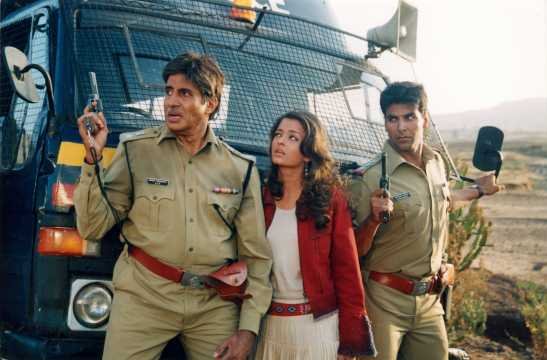
(She would go on to reprise her damsel-in-distress role in the Pink Panther franchise, starring Steve Martin.) Rai appears as an unwanted extra in a film about a group of police officers on a booby-trapped road trip.
Until the iconic football stadium scene, in which she reveals herself to a surprised Akshay Kumar as the green-eyed “mole” – and stealthy lover – of the scar-faced villain (Ajay Devgn). It’s an iconic moment, but it’s also one that’s been well-planned.
4. Being Cyrus (2006)
Saif Ali Khan starred as the enigmatic titular outsider who infiltrates a troubled Parsi household with an ulterior agenda in Homi Adajania’s first film, an unusual English-language drama.
A spaced-out sculptor (Naseeruddin Shah), his amorous wife (Dimple Kapadia), her sleazy brother-in-law and boyfriend (Boman Irani), and his deluded old man (Honey Chhaya) with a pot of gold: everyone in the family is a nut. The voiceover-driven plot revolves around a deranged Cyrus who takes them all for a ride.
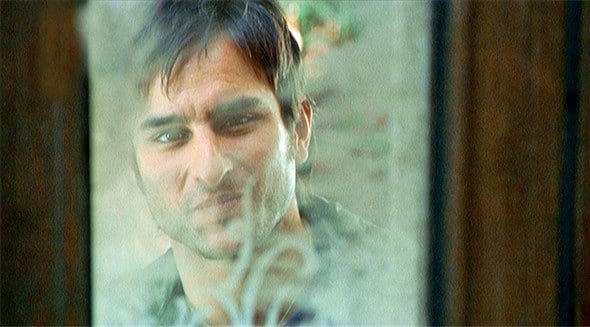
The property heist is subsequently conducted by a woman, even though he is the man of the mad hour. Nobody, including the audience, suspects the sole shy female member – the lover’s wife (Simone Singh) – of being anything more than a plot device.
The twist: she’s Cyrus’ sister, and after framing the others, they acquire a fortune. The unorthodox film’s creepy tone makes the ending appear much cooler than it is. It was inevitable that something would give, and it did.
5. Manorama Six Feet Under (2007)
Navdeep Singh’s first film, inspired by Chinatown, is a superb murder mystery that incorporates the concept of writing — the protagonist is a failing author – into the small-town Indian mix of sex, corruption, and political power.

There is no one twist because Satyaveer (Abhay Deol), the core truth-seeker, tears away layer after layer of what could have been a sophisticated web of contrivances in the hands of a lesser filmmaker.
Every layer reveals something new, and practically every character is posing as someone else.
Satyaveer’s discovery that the powerful villain is a pedophile who used a children’s orphanage as a breeding ground is reminiscent of a sub-plot in Madhur Bhandarkar’s Page 3, but the final twist – two dead characters are revealed to be siblings who devised an elaborate plan – is the icing on a cake of wet literary dreams.
6. Kahaani (2012)
Kahaani by Sujoy Ghosh was well-paced, yet it wasn’t flawless. The pregnant protagonist Vidya Bagchi’s (Vidya Balan) flashbacks were visual red herrings designed simply to deceive the audience about the identity of her absent husband.

Kahaani, on the other hand, became a cunning cat-and-mouse game between its plot and its spectators for those who forgave the film’s freedom to deceive.
A pregnant lady searching for justice in an eerie Kolkata leads to a twist that plays on our preconceived preconceptions about women and “manly” thrillers once again.
Vidya was just faking her pregnancy to deceive men by weaponizing their reading of feminine vulnerabilities, as revealed in a magnificently shot climax.
The majority of us took a double-take because there was a twist in the story that put our perceptions of a male-dominated medium to the test. As a result, the one-word title became a broad daylight twist.
7. A Wednesday! (2008)
Anupam Kher starred in Neeraj Pandey’s first film as a police commissioner who is on pins and needles because a man (Naseeruddin Shah) has threatened to blow up the city unless four terrorists are released.
This nameless individual, who is working from a hi-tech setup on an average terrace, looks to be a plain-clothed terrorist who wants his demands satisfied until the very end.

However, a peculiar change of events reveals him to be “just a regular guy” who is sick of watching his city be destroyed by “these people”, and a scorching monologue at the conclusion reveals him to be “just a common man” who is sick of watching his city be destroyed by “these people.”
The verdict is still out on the premise’s Islamophobic undercurrent and troublesome politics, but the twist is wonderfully phrased and done on a storytelling level.
It never second-guesses itself and provides a lyrical duality to the tale of modern citizen rage through two faces on different sides of the law and life.
8. Andhadhun (2018)
I’m a sucker for the blind man’s bluff, and Mohra came close to making this list. After all, you don’t want to be the one to “see” it coming.
However, Sriram Raghavan’s most effective film subverts not just one scene, but a whole pattern to depict blatant ambition, deception, and deadly liaisons.

The surprise is that the twist isn’t the actual twist — the blind piano player shows that he isn’t blind early on, and the rest of the movie becomes a murky survival thriller.
But Andhadhun’s final shot fundamentally alters our perception of the “hero’s” morality. He gently knocks a can out of his way with his cane, an impulsive act that implies the man had never truly evolved and was still faking his way to his dream. Despite garnering our sympathies, he was just one of many villains in a story full of them.
Special Mentions:
1. Talaash: “Kareena is a ghost” may not have the same ring to it as “Kajol is the killer,” but Reema Kagti gives it her all.
2. Farhan Akhtar plays a damaged architect who leaves voice notes for himself in Kartik Calling Kartik, but the film falls barely short.
3. Ugly: Anurag Kashyap directs our attention to Mumbai’s murky bylanes, where the body of a lost small girl rots in a bike sidecar, her kidnapping staged by her father.
4. 404: Nishikant Kamat plays a haunted student who discovers that he is being exploited as a guinea pig by a science professor who doesn’t believe in ghosts.
5. Ittefaq: In this skillfully cast reworking of an old pattern, Akshaye Khanna and Sidharth Malhotra appear. Until the tables are flipped, Cool Khanna as an overly sharp cop is expected to have the upper hand on muscular Malhotra as the innocent suspect.in
Also Checkout: Remembering Khakee: A Refreshing But Underappreciated Cop Film






